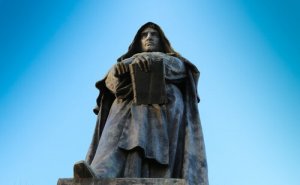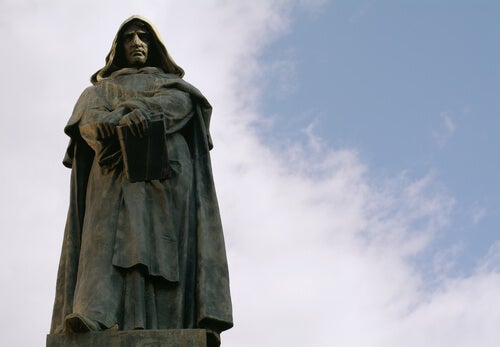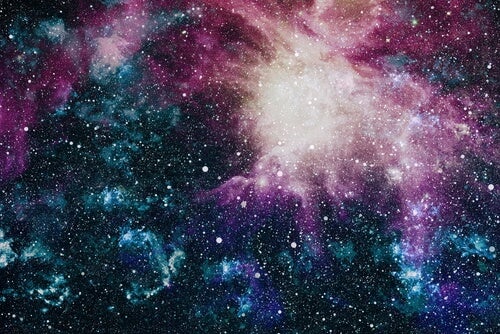Giordano Bruno - His Best Phrases

Giordano Bruno was born in Naples in 1549 and joined the Dominican Order at a very young age. Inspired by Saint Thomas Aquinas’ theology and Aristotle’s philosophy, he stood out for his lucid mind and ability to reason.
The tragic life of Giordano Bruno
Bruno had to drop his studies at the age of 17 years because he was accused of thinking differently from the accepted doctrine. And although he was ordained a priest in 1572, he soon had to flee to avoid incarceration due to his ideas.
After a long exile of almost 20 years, he returned to Italy in 1591. However, his philosophy, his way of seeing life, and his ideas about a spherical planet Earth in a huge universe full of suns and planets similar to it made him the target of the Inquisition.
After eight years in prison, Giordano Bruno remained faithful to his ideas and way of thinking. He refused to retract his writings, which is why he was eventually sentenced to burn at the stake in the year 1600.

Giordano Bruno phrases
Giordano Bruno died at the age of 51, condemned by the most powerful, and oldest, institution of his era. By analyzing his legacy, you can see an ode to the freedom of thought. This is why it’s worth knowing a little about the philosophy of this outstanding thinker from the Renaissance.
The light of life
“There are countless suns and countless Earths all rotating around their suns in exactly the same way as the seven planets of our system. We see only the suns because they are the largest bodies and are luminous, but their planets remain invisible to us because they are smaller and non-luminous.”
Bruno was soon aware of the importance of the sun in our lives. So much so that he sensed that its light was essential for human existence. In this era, it’s clear, for example, that sunlight is a precious source of vitamin D and that its presence in the sky makes people less vulnerable to depression.
Light always comes back after the darkest night
“No matter how dark the night is, I wait for the dawn, and those who live in the day wait for the night. Therefore, rejoice, and remain whole, if you can, and return love with love.”
An important part of Giordano Bruno’s philosophy was related to integrity and solidarity. Also, of course, it was flooded with the Renaissance spirit itself, more optimistic than the earthly hopelessness that the middle ages presided over. Thus, Giordano understood that all humans go through stages of darkness in which they might have to fight not to sink. Thus, they leave the adventure of coming to the surface when the light returns.
The complexity of human beings
“There’s a world, a universe in every man; in every individual.”
Bruno was a Renaissance man but also a humanist ahead of his time. Therefore, he considered each human being a complex entity, a unique little universe. There’s no doubt of it today and society even developed this idea to enrich the concept of intelligence; multiple intelligences, that is.
Giordano Bruno on overtime
“Time gives all and takes all away; everything changes but nothing perishes.”
Is there a universal balance? There seems to be for Bruno. Fashions may be temporary changes but, in the end, humans are still here. Thus, is it possible for nothing to die? Perhaps because, even after his death, people are still talking about this philosopher. Although a lot of things have changed, his teachings remain and won’t go away any time soon.
The truth in the sky
“So, truth lives where Ursa Major used to, the most prominent part of the sky, because it is the highest and most dignified spot.”
Giordano Bruno often used metaphors. This is why he associates the Big Dipper, the bright star of the sky, with the truth. According to him, it’s the one with the highest dignity to which a human being can aspire.

Art and science
“Wherever you see the nine-string Lyre there is Mother Muse with her nine daughters: Arithmetic, Geometry, Music, Logic, Poetry, Astrology, Physics, Metaphysics, and Ethics.”
Finally, here’s this beautiful phrase of Bruno that associates the muse with the arts and sciences. Although some of this knowledge is no longer around because new sciences appeared and some of them lost importance, such as astrology or metaphysics, it’s still a wonderful association.
Giordano Bruno was born in Naples in 1549 and joined the Dominican Order at a very young age. Inspired by Saint Thomas Aquinas’ theology and Aristotle’s philosophy, he stood out for his lucid mind and ability to reason.
The tragic life of Giordano Bruno
Bruno had to drop his studies at the age of 17 years because he was accused of thinking differently from the accepted doctrine. And although he was ordained a priest in 1572, he soon had to flee to avoid incarceration due to his ideas.
After a long exile of almost 20 years, he returned to Italy in 1591. However, his philosophy, his way of seeing life, and his ideas about a spherical planet Earth in a huge universe full of suns and planets similar to it made him the target of the Inquisition.
After eight years in prison, Giordano Bruno remained faithful to his ideas and way of thinking. He refused to retract his writings, which is why he was eventually sentenced to burn at the stake in the year 1600.

Giordano Bruno phrases
Giordano Bruno died at the age of 51, condemned by the most powerful, and oldest, institution of his era. By analyzing his legacy, you can see an ode to the freedom of thought. This is why it’s worth knowing a little about the philosophy of this outstanding thinker from the Renaissance.
The light of life
“There are countless suns and countless Earths all rotating around their suns in exactly the same way as the seven planets of our system. We see only the suns because they are the largest bodies and are luminous, but their planets remain invisible to us because they are smaller and non-luminous.”
Bruno was soon aware of the importance of the sun in our lives. So much so that he sensed that its light was essential for human existence. In this era, it’s clear, for example, that sunlight is a precious source of vitamin D and that its presence in the sky makes people less vulnerable to depression.
Light always comes back after the darkest night
“No matter how dark the night is, I wait for the dawn, and those who live in the day wait for the night. Therefore, rejoice, and remain whole, if you can, and return love with love.”
An important part of Giordano Bruno’s philosophy was related to integrity and solidarity. Also, of course, it was flooded with the Renaissance spirit itself, more optimistic than the earthly hopelessness that the middle ages presided over. Thus, Giordano understood that all humans go through stages of darkness in which they might have to fight not to sink. Thus, they leave the adventure of coming to the surface when the light returns.
The complexity of human beings
“There’s a world, a universe in every man; in every individual.”
Bruno was a Renaissance man but also a humanist ahead of his time. Therefore, he considered each human being a complex entity, a unique little universe. There’s no doubt of it today and society even developed this idea to enrich the concept of intelligence; multiple intelligences, that is.
Giordano Bruno on overtime
“Time gives all and takes all away; everything changes but nothing perishes.”
Is there a universal balance? There seems to be for Bruno. Fashions may be temporary changes but, in the end, humans are still here. Thus, is it possible for nothing to die? Perhaps because, even after his death, people are still talking about this philosopher. Although a lot of things have changed, his teachings remain and won’t go away any time soon.
The truth in the sky
“So, truth lives where Ursa Major used to, the most prominent part of the sky, because it is the highest and most dignified spot.”
Giordano Bruno often used metaphors. This is why he associates the Big Dipper, the bright star of the sky, with the truth. According to him, it’s the one with the highest dignity to which a human being can aspire.

Art and science
“Wherever you see the nine-string Lyre there is Mother Muse with her nine daughters: Arithmetic, Geometry, Music, Logic, Poetry, Astrology, Physics, Metaphysics, and Ethics.”
Finally, here’s this beautiful phrase of Bruno that associates the muse with the arts and sciences. Although some of this knowledge is no longer around because new sciences appeared and some of them lost importance, such as astrology or metaphysics, it’s still a wonderful association.
This text is provided for informational purposes only and does not replace consultation with a professional. If in doubt, consult your specialist.







